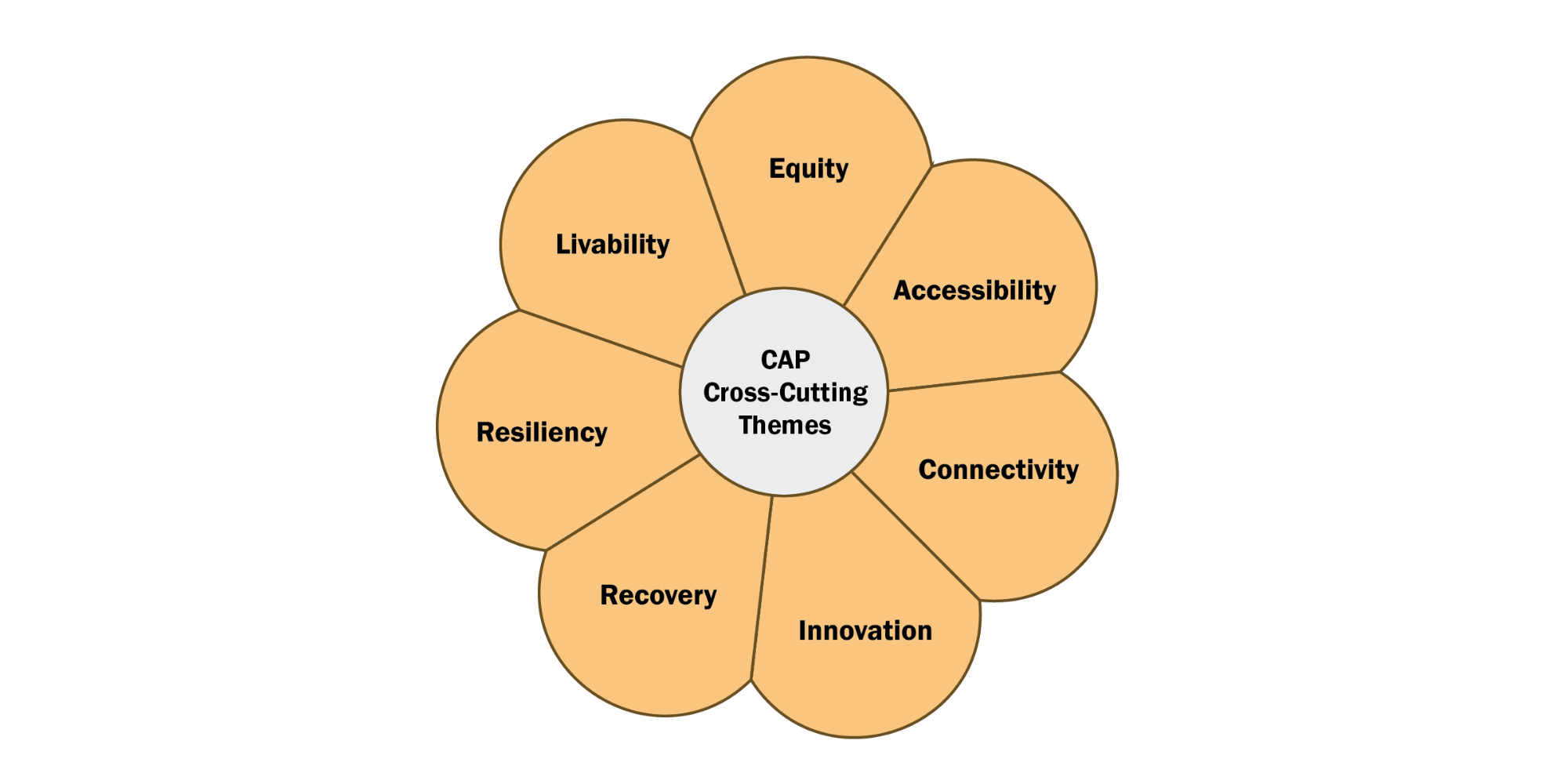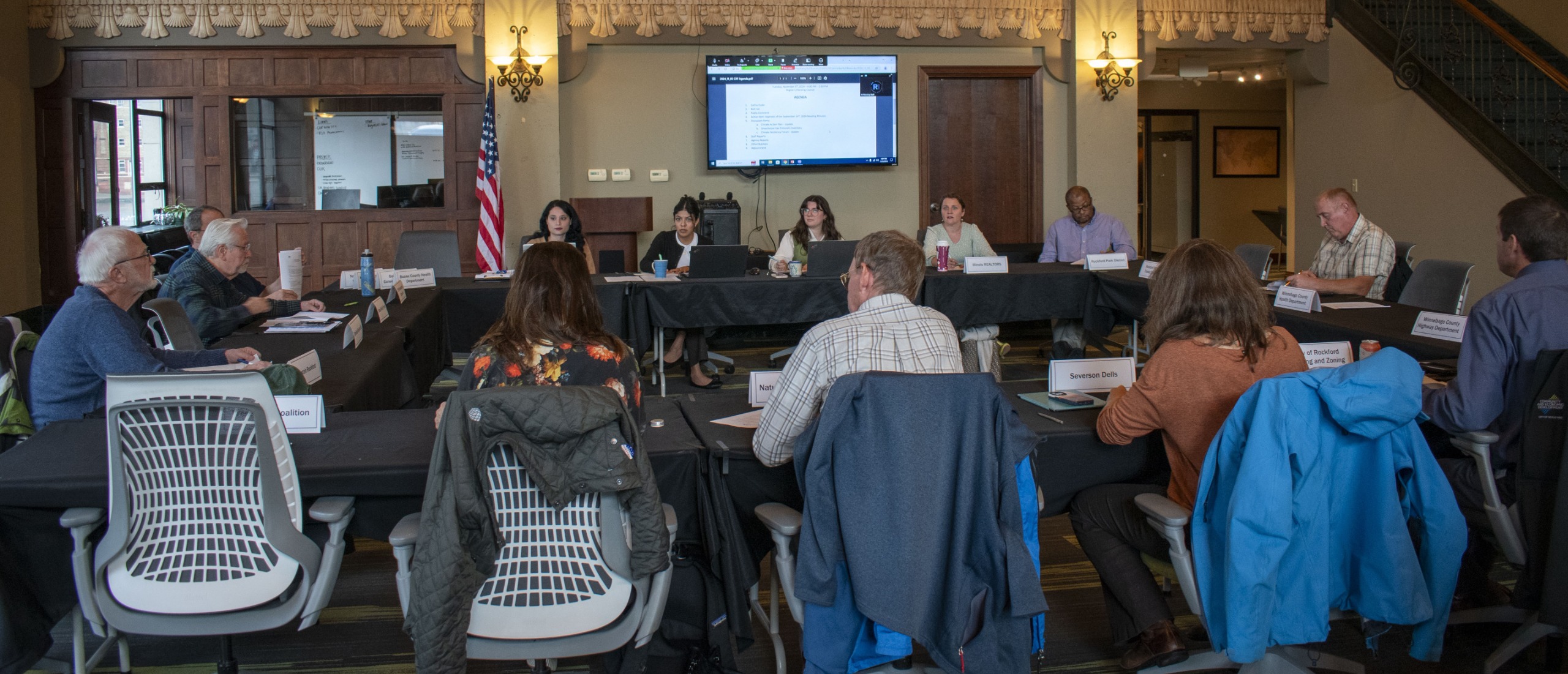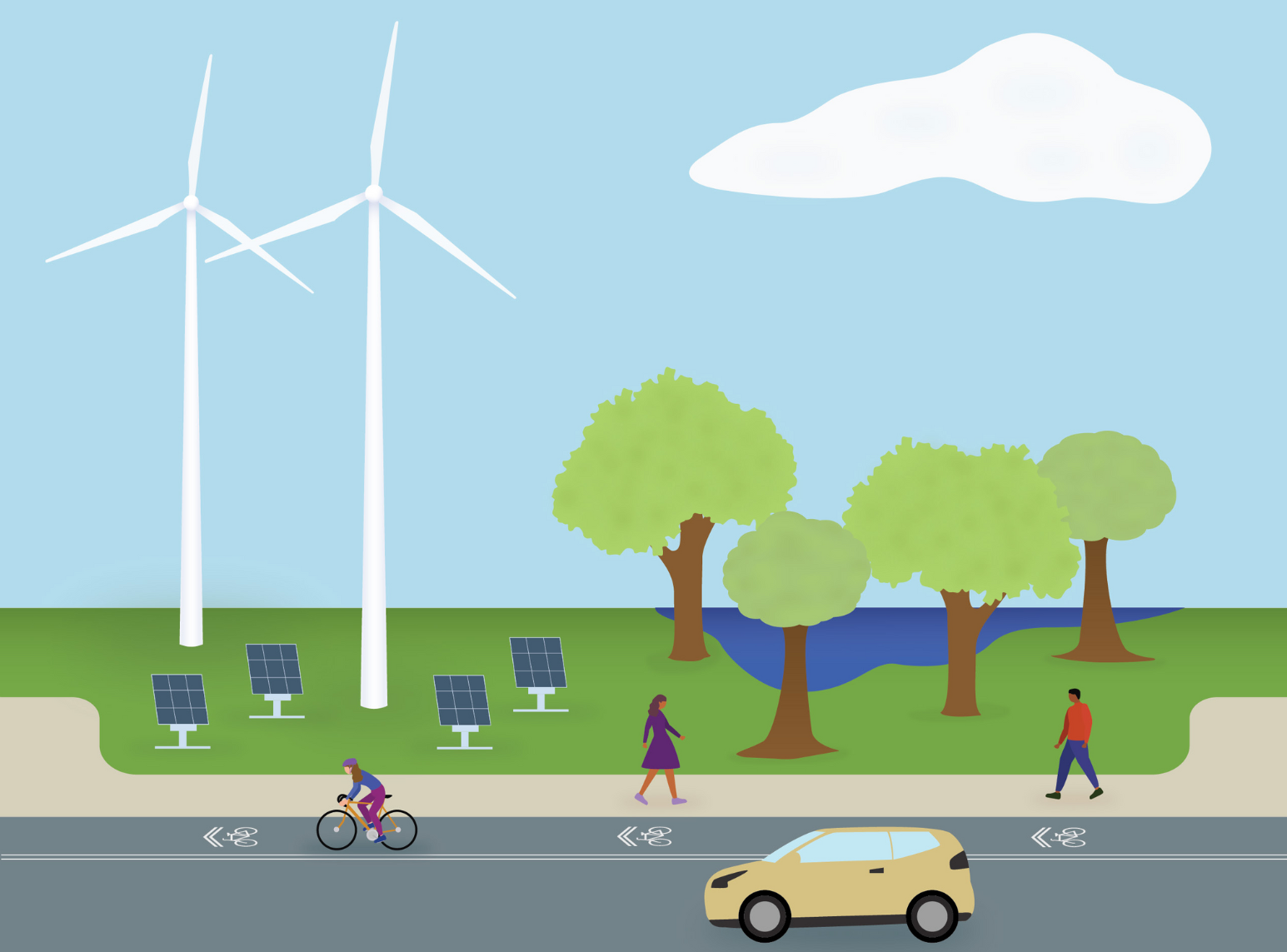Overview
The Region 1 Planning Council (R1) Climate Action Plan (CAP) serves as the blueprint for advancing collaborative and informed climate action within Boone and Winnebago counties. This plan is the first regional approach to preparing for and responding to the local impacts of climate change.
Climate change poses severe threats to environmental, economic, and public health. The CAP focuses on successful and equitable climate change mitigation and adaptation strategies that align with community needs. The plan considers the physical and direct impacts of climate change including extreme temperatures, severe storms, and flooding, but it will also consider the secondary impacts like declining biodiversity and public health impacts.
This webpage acts as a condensed, accessible online version of the plan. The full plan can be found here.
Background
Introduction to the Plan
Climate change threatens environmental, economic, and public health. Proactive climate action planning is essential in ensuring that the Rockford Region is climate-resilient to improve and maintain quality of life for all citizens.
Although no federal or state laws require government agencies to adopt a CAP, climate action planning is a recognized best practice by international and national organizations. Many federal, state, and municipal governments adopt CAPs to help reduce global and local GHG emissions and move toward a more climate-resilient future.
Climate change refers to long-term shifts in temperatures and weather patterns resulting from natural and human-related increases in greenhouse gas (GHG) emissions.
Human-caused GHG emissions are the main driver of climate change, primarily due to the burning of fossil fuels. Fossil fuels, like coal, oil, and gas, emit carbon dioxide and methane into the atmosphere. Everyday examples of emissions include driving gasoline-powered vehicles and heating buildings with coal-generated power.
As a result of these emissions, the global average temperature of Earth’s surface is now 1.8°F warmer than it was before the Industrial Revolution. Changes in global average temperature lead to an increase in extreme weather events, droughts, rising sea levels, flooding, diseases, and habitat and biodiversity decline. These shifts pose many risks to the ecosystem and human health.
- Mitigation lessens the rate and magnitude of climate change impacts. Mitigation prevents and prepares for associated climate risks through measures, such as reducing GHG emissions.
- Adaptation responds to the current effects of climate change. Adaptation adjusts current practices and infrastructure to be able to handle impacts already occurring, such as flooding.
Together, these strategies provide a framework to prepare for and respond to climate impacts.
A regional Climate Action Plan (CAP) is a comprehensive plan that assesses a region’s current ability to prepare for and respond to climate change, identifies climate action targets, and develops strategies that can be taken to help meet climate action goals.
This plan addresses and identifies prevention strategies for the most direct impacts of climate change in the region, such as extreme temperatures and storm severity, as well as secondary effects, including public health risks, the spread of invasive species, and worsened air and water quality.
Cross-Cutting Themes
Cross-cutting themes provide a framework for climate mitigation and adaptation planning activities in the Rockford Region over the next 25 years. The seven cross-cutting themes include recovery, resiliency, equity, accessibility, innovation, livability, and connectivity.

Community & Stakeholder Involvement
The Climate Action Plan incorporated public and stakeholder engagement throughout the entire planning process.
Public Engagement: The plan was presented to and requested input from the public at popular community events, committee meetings, and locations, such as City Market, Severson Dells Science Saturdays, Food Truck Tuesdays, libraries, etc.
Stakeholder Involvement: The plan was informed by the Climate Resiliency Forum, which was the steering committee for the plan and consisted of regional, municipal, environmental, and community organizations and experts.

Climate Resiliency Forum Members
Climate Impacts
Local Impacts of Climate Change
The Rockford Region is primarily affected by two aspects of climate change: extreme heat and increased storm severity. The CAP examines current and projected local climate trends to illustrate how they influence the region’s environment and society.
Extreme heat events bring dangerously high temperatures, sometimes lasting for days. They are defined by long durations and nights where temperatures do not fall below 80 degrees F. Extreme heat can lead to water shortages, harm ecosystems and agriculture, increase energy demands, and pose serious health risks, such as heat exhaustion.
Severe storms are becoming stronger and more destructive as our climate changes, causing heavier rainfall, stronger winds, and more frequent flooding. These storms can damage homes, roads, and power systems, disrupt communities, and pose serious health risks.
Climate Sectors
The six priority climate sectors in the Rockford Region include air quality and emissions, built environment, energy, natural and working lands, waste management, and water. The plan analyzes how each sector contributes to or experiences the impacts of climate change and highlights the sector’s current conditions in the region.
Click on the icons on the image below to learn about each climate sector and how it is impacted by or contributes to climate change!

Goals & Strategies
Regional Vision
Climate Action Plan Goals & Strategies
Goals are broad aspirations the region would like to achieve over the next 25 years. One goal is attributed to each of the six designated climate sectors: Air Quality and Emissions, Built Environment, Energy, Natural and Working Lands, Waste, and Water.

Goal #1. Improve the region’s air quality and reduce greenhouse gas emissions.
- Strategy 1.1. Reduce regional greenhouse gas (GHG) emissions.
- Strategy 1.2. Maintain attainment status and improve air quality.
Goal 2. Promote strategic and climate-resilient development within the built environment.
- Strategy 2.1. Minimize environmental impacts on infrastructure.
- Strategy 2.2. Support sustainable development practices that improve community resilience.
- Strategy 2.3. Mitigate the urban heat island effect and reduce exposure to extreme heat.
- Strategy 2.4. Enhance quality of life through improved access to opportunities.
Goal 3. Improve energy resilience by advancing clean energy and energy efficiency efforts.
- Strategy 3.1. Promote clean energy and energy efficiency efforts through educational initiatives.
- Strategy 3.2. Strengthen energy infrastructure to handle climate impacts and increased energy demand.
- Strategy 3.3. Increase clean energy jobs and energy training programs.
Goal 4. Cultivate a conservation mindset to preserve, restore, and sustainably manage natural and working lands.
- Strategy 4.1. Preserve and sustainably manage the natural environment.
- Strategy 4.2. Restore the region’s native biodiversity and habitats.
- Strategy 4.3. Increase knowledge and implementation of sustainable agriculture and land management practices.
Goal 5. Promote sustainable waste management practices and technology.
- Strategy 5.1. Increase landfill diversion rate and support sustainable material management.
- Strategy 5.2. Incentivize waste emissions reductions and the use of emerging technologies.
- Strategy 5.3. Identify and address community solid waste needs.
Goal 6. Support water resource management.
- Strategy 6.1. Protect water quality for drinking water and aquatic habitats.
- Strategy 6.2. Increase education on water conservation and quality to minimize pollution and prepare for any potential changes to the water supply.
- Strategy 6.3. Promote drought planning practices to prevent water scarcity.
Goal 7. Support communities and businesses in preparing for the effects of climate change.
- Strategy 7.1. Support sustainable innovation and economic growth that promotes green business models.
- Strategy 7.2. Improve community resiliency and emergency response in preparation for climate disasters.
- Strategy 7.3. Ensure climate investments address community inequities.
- Strategy 7.4. Establish the Rockford Region as a climate haven.
Tracking Progress
Collaboration is Key!
Achieving the goals of the Climate Action Plan takes all of us working together. From local governments and businesses to community groups and residents, everyone has a role to play. When these groups collaborate, we can make smarter decisions, reflect diverse needs, and ensure no one is left out.
Ongoing conversations and partnerships help identify new ideas, potential projects, and funding opportunities. Collaboration helps distribute responsibilities across partners possessing unique resources and capabilities, thereby increasing the overall capacity to implement the plan. By combining our strengths and resources, we can work together to build a more resilient and sustainable region for all.
-
-
Government
-
Partners
Want to discuss how we can work together?
We would be happy to talk about how you or your organization can help implement or promote the Climate Action Plan! Feel free to contact the project lead, Lauren Kleve, at lkleve@r1planning.org to ask any questions or schedule a meeting.





